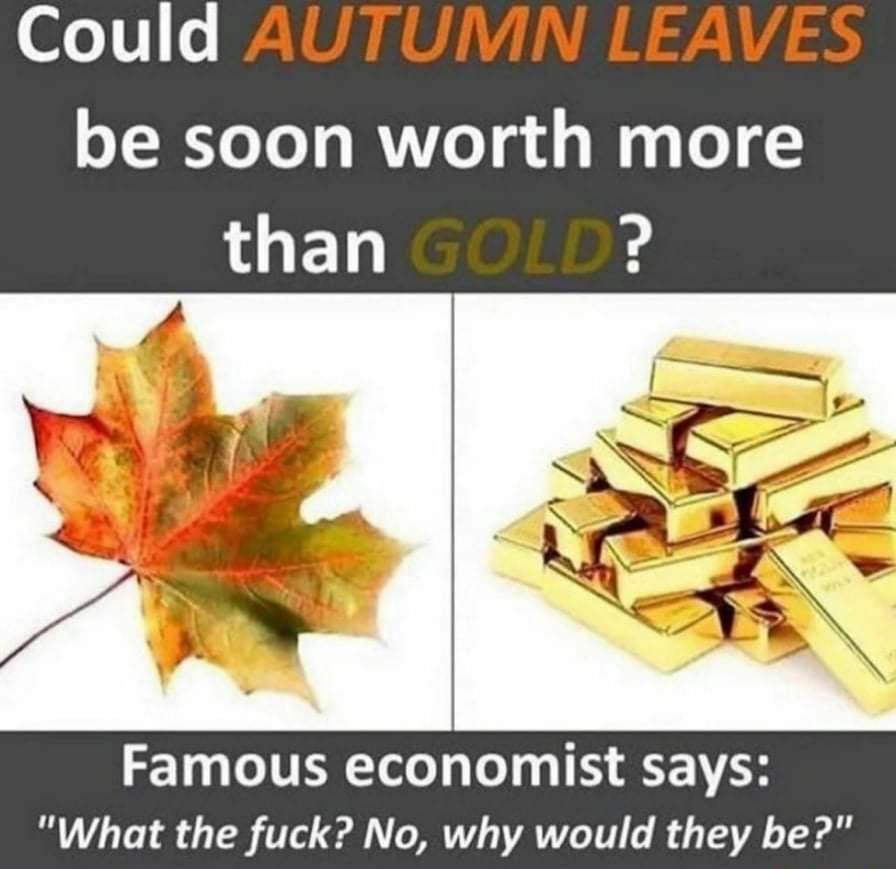Well for starters, at least one famous economist would be discredited.

How can it be valuable when there’s so many dead leaves? Unless you mean to say they become exceedingly rare, in which case the ecosystem is screwed.
That rules out the onvious… plant a fuck ton of Japanese maples. Whatever it is giving them value, the little weed shaped leaves are guna be top dog.
Size indicates value. You just planted pennies :p
Nobody specified the value per leaf. Even if it was 1 cent per leaf people would be planting fuckloads of trees just to make money of the leaves every year.
People would start killing trees for the dead leaves.
Unfortunately I don’t think I’m even being cynical.We will trees for lumber. This isn’t cynical at all.
No, you’ll trees.
You don’t need to axe murder the tree to get leaves. I expect it to be more economically sustainable to keep your tree alive.
Lumber is the body, so not killing the tree is kinda off the table.
There are old methods of getting lumber from trees by cutting them short and letting the limbs grow back. The Japanese “daisugi” and European “copsing” are two different styles of the same idea. The fact that we don’t see those done much in the modern era makes me think that the industrial-capitalist mind would not comprehend the idea of waiting for leaves to fall.
But leaves are suuuuuuuper valuable now.
Alas, I don’t think that’s being cynical at all. Or maybe I’m, too?
It would have a devastating effect on the eco system, since many flora and fauna depend on those leaves (for shelter, to feed on, to hunt in, to lay eggs on), and many more flora and fauna depend on those that depend on the leaves, and capitalism doesn’t give a fuck so the leaves would promptly be removed from the environment by one corporation or another so that they can profit, and we’d be fucked even further.
In short time the only trees allowed would be on corporate property. They would grow rows of one type of gmo trees with maximized leaf growing ability. They would use leaves to pay wage slaves to harvest leaves.
They would use leaves to pay wage slaves to harvest leaves.
Wage Slave: Please sir, my family is starving.
Corpo: Silence! You know the punishment for theft.
Wage Slave: But sir! In a single 14 hour shift, me and my coworkers bring in an average of 1.2 tons of dead leaves a day. It costs but a handful of leaves to feed my children, and a small paper bag to house them.
Corpo: Ah, so you know of your costs, yes. But you think not of the costs for those who would pay you. My costs are numerous, and if I am to pay you, and pay still more of your coworkers, they must first be met, and met in full.
WS: You are right, sir, of course. Forgive me, for I know not the burdens beared by those cursed with fortune.
C: Then allow me to educate you! Your coworkers and you bring to me 1.2 tons of leaves everyday. Every day! Do you know the cost of storing 1.2 tons of leaves?
WS: I have never had the leaves necessary to warrant storage, sir. What a burden this must be.
C: A burden, yes! And what’s more! If I am to leave my leaves unattended, who is to say the likes of you won’t come in the night to take what I have rightfully earned?
WS: Another thought a stranger to me, sir, for I have naught the possessions to fear theft, save for which I have thusly stolen from you.
C: Indeed! And lucky you should feel to be worry free of thievery! And finally. Why is it, do you think, that not everyone grows their own trees, farms their own leaves?
WS: This I do know, sir! This is the law of the land!
C: The law of the land, precisely. But the law does not avail itself cheaply to those who have; nay, for those burdened with the curse of fortune, justice is bought, and bought with deep pockets. For the cost of justice far exceeds the cost of storage, the cost of vigilance, even the cost of labor (which, as a laborer yourself, I need not remind you is exorbitantly high!).
WS: I have never thought to purchase a law before.
C: And it is my wish that you never shall. Great are the troubles of those forced into my position. This is why you must toil, why the days must grow longer and the suppers fewer and further in between, why those who have must always have, and those who don’t must never receive; lest you be faced with the ugly wrath of capitalism.
WS: Capitalism! Gods, anything but that!
C: So you see now, Wage Slave, why you must accept this punishment for reaching out to the forbidden fruit.
WS: Please, sir, a decade of unpaid labor is but a gift to someone like me, who was but this close to falling into the clutches of prosperity!
C: Go, then, and sow for me now what I shall later have you reap.
WS: May I sow the same field you have my children working?
C: No.
WS: Thank you!
deleted by creator
Immediate inflation is what would happen.
That is a minor plot point in The Restaurant at The End of The Universe by Douglas Adams.
::: spoiler
They propose & implement a defoilage campaign to combat inflation. :::
It has already happened
Money can be anything.
https://en.wikipedia.org/wiki/Rai_stones https://en.wikipedia.org/wiki/Tulip_mania
I’d wish you a good harvest this fall!
The only way I can see that happening is if ailiens get in touch asking to buy them.
Then money really would grow on trees.
People who were already poor would remain so. Most people who aren’t wealthy can’t afford to own acres of land that doesn’t produce crops. If leaves suddenly became money, that would not change the fundamental needs people have of food and shelter. So you’d have the wealthy with vast swathes of forest that would slowly die as they carted out a lot of compost for use in markets, and people who live in apartments or other rental situations would never see a leaf on the ground again. You might see suburban homeowners get really good about caring for their trees and planting more, so that’s one possible benefit but overall this would be a nightmare.
I would be rich as fuck
People would start cutting down trees and plants so they could have more. Then that would cause inflation which in turn would cause people to cut more trees and plants. Carbon dioxide would soar, and then we all die.
So, nothing changes, got it.
Cut down all trees, untill only one is left. Build an army that serves to protect that one tree for its owner.
Time to burn down some forests to save the economy and start a job as a telephone disinfectant







